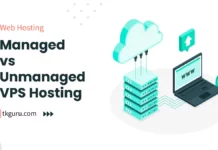Advertisements
Ratings

Pros and Cons of Upgrading from Shared Hosting to VPS – Selecting the right hosting solution is essential for your website’s success. As your website grows, upgrading from shared hosting to a Virtual Private Server (VPS) becomes a critical decision.
In this guide, we’ll explore the advantages and drawbacks of making this transition to help you make an informed choice.
Contents
Shared Hosting: Multiple websites share resources on a single server, leading to lower costs but limited performance and customization.
VPS Hosting: A VPS offers dedicated resources within a shared environment, providing improved performance, scalability, and control.
2. Pros of Upgrading to VPS
2.1 Enhanced Performance
Shared Hosting: Resources are shared among multiple users, leading to potential performance bottlenecks.
VPS Hosting: Dedicated resources ensure faster loading times, smoother navigation, and improved overall website performance.
2.2 Scalability
Shared Hosting: Limited scalability due to shared resources, potentially causing performance issues with increased traffic.
VPS Hosting: Scalability is enhanced with the ability to easily upgrade resources, accommodating growing traffic and demands.
2.3 Customization and Control
Shared Hosting: Limited control over server settings and software installations.
VPS Hosting: Enjoy complete control over configurations, software, and security settings, tailoring the environment to your needs.
2.4 Better Security
Shared Hosting: Security vulnerabilities in one website can affect others due to shared resources.
VPS Hosting: Isolated environments offer enhanced security, with options for custom firewalls and advanced security measures.
2.5 Isolation from Other Users
Shared Hosting: Shared resources mean one website’s performance or security issues can impact others.
VPS Hosting: Isolation ensures your website operates independently, reducing the risk of external impacts.
3. Cons of Upgrading to VPS
3.1 Higher Cost
Shared Hosting: Affordable due to resource sharing, making it a budget-friendly option.
VPS Hosting: Costs more due to dedicated resources and enhanced features, which might not fit all budgets.
3.2 Technical Knowledge Required
Shared Hosting: Little to no technical expertise needed, making it suitable for beginners.
VPS Hosting: Requires a certain level of technical proficiency to manage the server effectively.
3.3 Responsibility for Server Management
Shared Hosting: Provider handles most technical aspects, including updates and security.
VPS Hosting: You’re responsible for server management tasks like updates, security, and maintenance.
3.4 Potential Resource Overkill
Shared Hosting: Resources are shared efficiently among websites, reducing waste.
VPS Hosting: Overestimating resources can lead to unnecessary expenses and underestimating can hinder performance.
Summary Table: Shared Hosting vs VPS Hosting
| Features | Shared Hosting | VPS Hosting |
|---|---|---|
| Performance | Shared resources might lead to performance bottlenecks. | Dedicated resources ensure faster loading times and improved overall performance. |
| Scalability | Limited scalability due to shared resources. | Easily upgrade resources to accommodate growing traffic and demands. |
| Customization | Limited control over server settings and software installations. | Complete control over configurations, software, and security settings. |
| Security | Security vulnerabilities in one website can affect others. | Isolated environments offer enhanced security with custom firewalls. |
| Isolation | One website’s issues can impact others. | Your website operates independently, reducing the risk of external impacts. |
| Cost | Affordable due to shared resources. | Costs more due to dedicated resources and enhanced features. |
| Technical Expertise | Little to no technical expertise needed. | Requires technical proficiency to manage the server effectively. |
| Management | Provider handles most technical aspects. | You’re responsible for server management tasks. |
| Resource Management | Resources are shared efficiently among websites. | Overestimating resources can lead to unnecessary expenses. |
Conclusion
Choosing whether to upgrade from shared hosting to VPS involves weighing the pros and cons based on your website’s specific needs and future growth.
Final Thoughts
Upgrading to VPS hosting offers enhanced performance, scalability, control, and security, but it comes at a higher cost and requires technical expertise. Evaluate your website’s demands and consider factors such as budget, technical proficiency, and growth potential when making this decision.
What are the advantages of upgrading from shared hosting to VPS?
Advantages of upgrading to VPS hosting include:
- Performance: Dedicated resources result in better website performance and faster loading times.
- Control: You have more control over server settings and configurations.
- Scalability: VPS hosting allows you to easily scale resources as your website grows.
- Isolation: Your website is isolated from other users, reducing the risk of resource contention.
- Security: Enhanced security measures can be implemented on a VPS.
Are there any drawbacks to moving from shared hosting to VPS?
Drawbacks of VPS hosting include:
- Higher Cost: VPS hosting is generally more expensive than shared hosting.
- Technical Expertise: Managing a VPS requires some technical knowledge, unlike managed shared hosting.
- Server Management: You're responsible for tasks like updates, backups, and security.
How does VPS hosting affect website performance compared to shared hosting?
VPS hosting offers better website performance because you have dedicated resources, eliminating the impact of other users on the server's performance.
Can I upgrade from shared hosting to VPS without downtime?
Most hosting providers offer migration services that minimize downtime during the transition. However, some downtime might occur during the migration process.
When is the right time to upgrade from shared hosting to VPS?
It's a good idea to consider upgrading to VPS when:
- Your website's traffic and resource demands increase.
- You need more control over server settings and configurations.
- Performance issues arise due to resource limitations in shared hosting.
Upgrading from shared hosting to VPS can offer substantial benefits in terms of performance, control, scalability, and security.
However, it's essential to weigh these advantages against the higher cost and increased technical responsibilities that come with VPS hosting.
| Web Hosting | Website |
| WordPress | Google Adsense |
| SEO | Affiliate Marketing |
| Blogging | YouTube |
Recent Posts
- 5 Best WordPress Hosting Provider in Somalia 2023
- 5 Best WordPress Hosting Provider in Austria 2023
- 5 Best WordPress Hosting Provider in Luxembourg 2023
- 5 Best WordPress Hosting Provider in Switzerland 2023
Related Tags
disadvantages of vps hosting, pros and cons of vps hosting, shared hosting vs vps vs dedicated, shared hosting vs vps reddit, vps hosting vs dedicated hosting, shared hosting vs cloud hosting vs vps, hostinger vps, hostinger vps pricing






